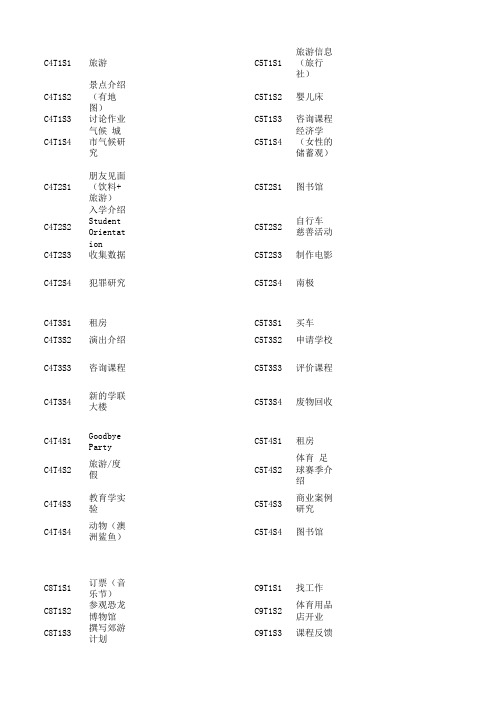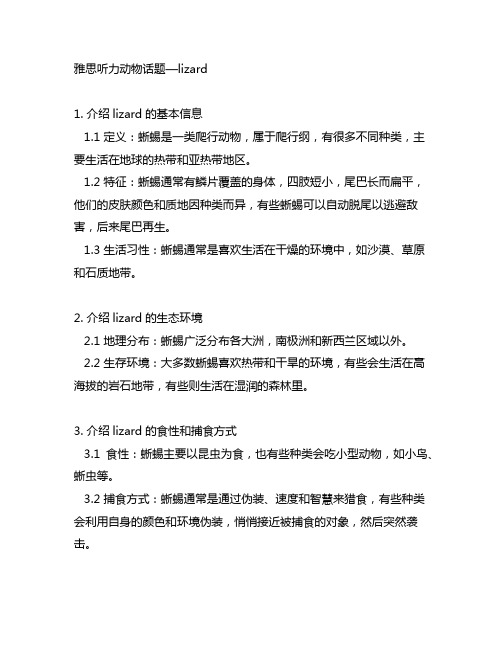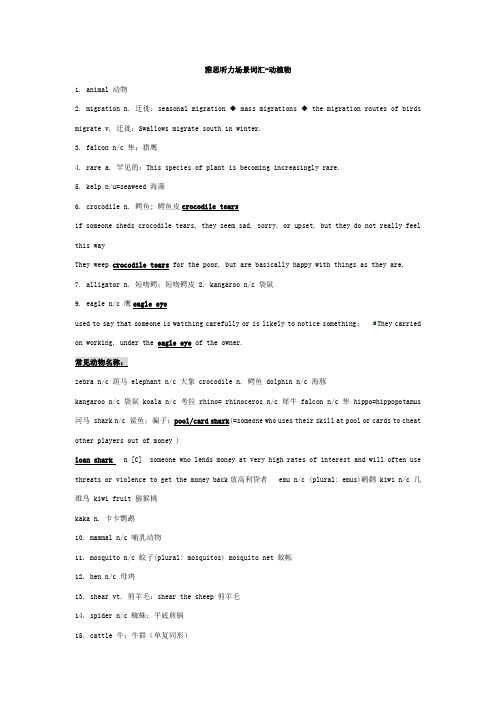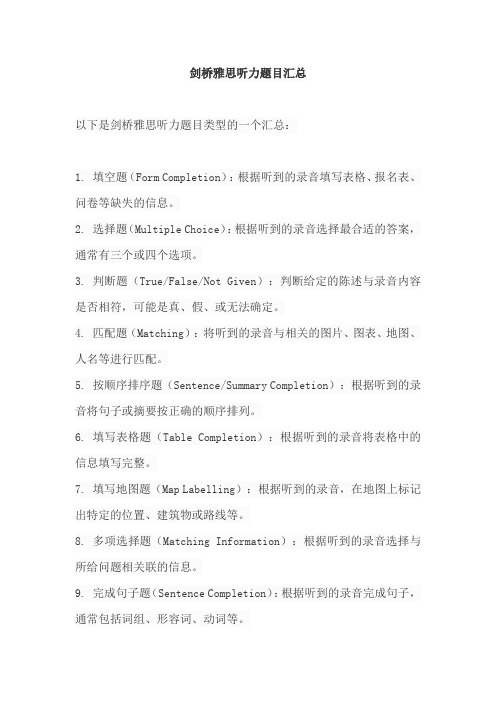各类雅思听力话题总结(最新)
各类雅思听力话题总结

各类雅思听力话题总结来讨论一下雅思听力中比较受宠的Travelling话题吧~ 这类话题一般会出现在前两个Section中,以对话或独白的方式给出。
下面是小编给大家整理收集的各类雅思听力话题总结,供大家参考,希望可以帮到大家!各类雅思听力话题总结由于国外比较注重享受生活,在有leisure time的时候,经常会琢磨着大伙一起出去渡个小假,旅个小游什么的。
一般话题在开始时,介绍即将前往的地点Where to go,这里就要有一些心理准备哦,因为一般会出现一些新的或者不太熟悉的词汇随后,一般会给出preparation for a trip的小tips,简单归类如下:如果去Mountains做hiking的话,就要准备好tent,hiking shoes/boots,rucksack(大登山包);为了防止迷路,还要准备好compass,cave torch/flash light;在勘察地形或者欣赏自然美景时binoculars也必不可少哦。
国外的自然环境比较好,还有可能会去rainforest之类的地点旅游,那么water-proof coat,strong walking boots;还有特别需要准备的insect repellent(驱虫剂),若需要过夜的话mosquito net(蚊帐)等也需备齐。
还很有可能来个惊险刺激的canoe trip啦,这时候就需要准备好washable shoes,sweater,high-energy snack等。
在岛屿类国家,还可以组织去tropical island来个冒险哦。
这时就需联系好ferry,准备好bottled water。
特别注意的是在晚上时可能会骤冷,所以准备好sweater和thick socks也很有必要。
为了以防万一,还需要准备一些医疗设备,以备不时之需,如first-aid kit,buy medicine at the chemist’s等,为了预防外出易染上的malaria,可能还需要先打vaccine。
雅思听力话题分类

C4T1S1旅游C5T1S1旅游信息(旅行社)C4T1S2景点介绍(有地图)C5T1S2婴儿床C4T1S3讨论作业C5T1S3咨询课程C4T1S4气候 城市气候研究C5T1S4经济学(女性的储蓄观)C4T2S1朋友见面(饮料+旅游)C5T2S1图书馆C4T2S2入学介绍Student Orientation C5T2S2自行车 慈善活动C4T2S3收集数据C5T2S3制作电影C4T2S4犯罪研究C5T2S4南极C4T3S1租房C5T3S1买车C4T3S2演出介绍C5T3S2申请学校C4T3S3咨询课程C5T3S3评价课程C4T3S4新的学联大楼C5T3S4废物回收C4T4S1Goodbye Party C5T4S1租房C4T4S2旅游/度假C5T4S2体育 足球赛季介绍C4T4S3教育学实验C5T4S3商业案例研究C4T4S4动物(澳洲鲨鱼)C5T4S4图书馆C8T1S1订票(音乐节)C9T1S1找工作C8T1S2参观恐龙博物馆C9T1S2体育用品店开业C8T1S3撰写郊游计划C9T1S3课程反馈C8T1S4为什么学习地理C9T1S4动物(鲸鱼和海豚搁浅)C8T2S1保险理赔C9T2S1租房(找宿舍)C8T2S2公园介绍(有地图)C9T2S2景点介绍(地图)C8T2S3动物(蜜蜂)C9T2S3自学中心Self Access Centre C8T2S4调查人们对医生的看法C9T2S4商业文化C8T3S1租房C9T3S1度假介绍C8T3S2国家艺术中心C9T3S2主题公园C8T3S3在南美的学习经历C9T3S3讨论论文C8T3S4商业模式C9T3S4市内装修C8T4S1找工作C9T4S1医疗咨询C8T4S2城市规划C9T4S2度假屋内设施(图表)C8T4S3奖学金/社团/考试C9T4S3讨论课程和老师C8T4S4远古壁画C9T4S4动物(鸟类)C6T1S1体育 健身房C7T1S1机场大巴C6T1S2剧院C7T1S2组织露营C6T1S3咨询课程C7T1S3企业管理C6T1S4历史 伦敦东区C7T1S4远古壁画C6T2S1活动介绍(儿童手工)C7T2S1购买车险C6T2S2旅游 火车站C7T2S2景点介绍(地图)C6T2S3收集数据C7T2S3南极探险C6T2S4电影发展史C7T2S4体育运动中的左撇子和右撇子C6T3S1银行账户C7T3S1找工作C6T3S2景点介绍 有地图C7T3S2徒步旅行C6T3S3音乐市场调查C7T3S3海洋探索(图表题)C6T3S4历史 新石器时代的爱尔兰C7T3S4旅馆和旅游业C6T4S1买票C7T4S1租房C6T4S2会议日程介绍C7T4S2徒步旅行(有地图)C6T4S3图书馆C7T4S3准备presentationC6T4S4动物 狮子C7T4S4MSG味精的历史。
雅思听力听力材料分类总结

雅思听力听力材料分类总结雅思听力考试是众多考生心中的痛点之一,其中最具挑战性的部分就是听力材料的理解和分类。
本文将对雅思听力材料进行分类总结,帮助考生更好地掌握听力技巧。
一、对话类型材料对话类型材料是雅思听力考试中最常见的类型之一。
通常包括两个人在特定场景下的对话,涉及各种场景,如旅行、租房、购物、餐厅等。
考生需要通过听力材料理解对话内容,回答相关问题。
针对对话类型材料,考生需要注意以下几点:1. 认真听取对话开始时的背景介绍,以了解对话发生的场景和情境,帮助理解对话内容。
2. 注意对话中的关键词,如数字、地点、姓名、时间等。
这些信息通常是回答问题的关键。
3. 通过对话中的语气、语调等来判断对话人的态度和情感,有助于更好地理解对话的意义。
二、讲座类型材料讲座类型材料是雅思听力中较为常见的一种。
它通常包括一个讲演者对某个话题进行详细解说,如科技、教育、科学等。
考生需要在听力过程中抓住重点,理解讲座内容并回答相应问题。
在倾听讲座类型材料时,下列技巧可能对您有帮助:1. 先仔细浏览听力问题,在听讲座时注意标记可能涉及到的关键词,帮助听取重点。
2. 注意讲座中的时间顺序,如过去、现在和未来,以便更好地理解演讲者的观点和观点演进。
3. 注意讲座中提到的举例和论证方式,它们通常是回答问题的线索。
三、问答类型材料问答类型材料在雅思听力考试中也是常见的一种。
它通常包括一个问题与其答案,考生需要在听力材料中找到正确的答案。
对于问答类型材料,下列技巧可能对您有所帮助:1. 注意问题中的关键词,在听力过程中迅速定位相关信息。
2. 注意听取回答中的特定细节,如时间、地点、人物等,以判断答案是否与问题相符。
3. 理解回答者的语气和语调,从中获取更多答案的线索。
四、任务型类型材料任务型类型材料是雅思听力考试中较难的一种。
它通常包括一系列问题和相应的选项或描述,考生需要根据听到的材料完成任务,如填写表格、地图或选择正确的选项。
雅思听力动物话题—lizard的

雅思听力动物话题—lizard1. 介绍lizard的基本信息1.1 定义:蜥蜴是一类爬行动物,属于爬行纲,有很多不同种类,主要生活在地球的热带和亚热带地区。
1.2 特征:蜥蜴通常有鳞片覆盖的身体,四肢短小,尾巴长而扁平,他们的皮肤颜色和质地因种类而异,有些蜥蜴可以自动脱尾以逃避敌害,后来尾巴再生。
1.3 生活习性:蜥蜴通常是喜欢生活在干燥的环境中,如沙漠、草原和石质地带。
2. 介绍lizard的生态环境2.1 地理分布:蜥蜴广泛分布各大洲,南极洲和新西兰区域以外。
2.2 生存环境:大多数蜥蜴喜欢热带和干旱的环境,有些会生活在高海拔的岩石地带,有些则生活在湿润的森林里。
3. 介绍lizard的食性和捕食方式3.1 食性:蜥蜴主要以昆虫为食,也有些种类会吃小型动物,如小鸟、蜥虫等。
3.2 捕食方式:蜥蜴通常是通过伪装、速度和智慧来猎食,有些种类会利用自身的颜色和环境伪装,悄悄接近被捕食的对象,然后突然袭击。
4. 介绍lizard的繁殖方式4.1 卵生:大多数蜥蜴是卵生动物,雌性蜥蜴通常会在土中挖掘洞穴,产下一批卵,然后覆盖土壤等待孵化。
4.2 胎生:也有些蜥蜴是胎生动物,它们会在体内孵化卵,然后生出幼崽。
5. 介绍人类与lizard的关系5.1 作为宠物:有些人会把蜥蜴作为宠物养在家里,因为它们的外貌和习性。
5.2 医学价值:蜥蜴的一些物质在医药领域有一定的应用价值,可能对治疗某些疾病有帮助。
6. 总结蜥蜴是一类特殊的爬行动物,它们在自然生态系统中扮演着重要的角色,同时也给人类带来了一定的好奇和利用价值。
希望人类能够更加关注和保护这些生物,共同构建一个和谐的生态环境。
当谈到爬行动物中的生物多样性时,蜥蜴是一个备受关注的话题。
它们具有独特的外貌和生活习性,因此备受人们的好奇。
下面我们将深入了解蜥蜴的一些有趣的特征和独特之处。
7. 蜥蜴的生理特征7.1 体温调节:蜥蜴是一种“变温动物”,它们的体温通常会随着周围环境的温度而变化。
最新雅思听力词汇(科普场景)

雅思听力场景词汇-动植物1. animal 动物2. migration n. 迁徙:seasonal migration ◆ mass migrations ◆ the migration routes of birds migrate v. 迁徙:Swallows migrate south in winter.3. falcon n/c 隼;猎鹰4. rare a. 罕见的:This species of plant is becoming increasingly rare.5. kelp n/u=seaweed 海藻6. crocodile n. 鳄鱼; 鳄鱼皮crocodile tearsif someone sheds crocodile tears, they seem sad, sorry, or upset, but they do not really feel this wayThey weep crocodile tears for the poor, but are basically happy with things as they are.7. alligator n. 短吻鳄;短吻鳄皮 8. kangaroo n/c 袋鼠9. eagle n/c 鹰eagle eyeused to say that someone is watching carefully or is likely to notice something:They carried on working, under the eagle eye of the owner.常见动物名称:zebra n/c 斑马 elephant n/c 大象 crocodile n. 鳄鱼 dolphin n/c 海豚kangaroo n/c 袋鼠 koala n/c 考拉 rhino= rhinoceros n/c 犀牛 falcon n/c 隼 hippo=hippopotamus 河马 shark n/c 鲨鱼;骗子:pool/card shark(=someone who uses their skill at pool or cards to cheat other players out of money )loan shark n [C] someone who lends money at very high rates of interest and will often use threats or violence to get the money back放高利贷者 emu n/c (plural: emus)鸸鹋 kiwi n/c 几维鸟 kiwi fruit 猕猴桃kaka n. 卡卡鹦鹉10. mammal n/c 哺乳动物11. mosquito n/c 蚊子(plural: mosquitos) mosquito net 蚊帐12. hen n/c 母鸡13. shear vt. 剪羊毛:shear the sheep 剪羊毛14. spider n/c 蜘蛛;平底煎锅15. cattle 牛;牛群(单复同形)16. pet n/c 宠物17. ape n/c 猿 vt. 模仿:He could ape his teachers perfectly.18. species n/c (单复同形)物种: pandas and other endangered species(=ones that may soon no longer exist) endangered species 濒危物种 extinct species 灭绝物种 rare species 稀有物种19. sea n/singular 海洋: seafood 海鲜 sea watch 海洋监测 sea otter 水獭sea urchin 海胆20. donkey n/c 驴21. lion n/c 狮子22. chick n/c 鸡雏23. wasp n/c 大黄蜂24. fur n/c 皮毛25. feather n/c 羽毛26. whale n/c 鲸鱼27. wood n. 木材28. wildlife n/u 野生动物29. plant n/c 植物(power plant)30. tree n/c 树:lemon tree柠檬树 rubber tree橡胶树 pine tree 松树 palm tree 棕榈树 willow n. 柳树;柳木30. crop n/c 农作物 cash crop 经济作物31. vegetation n/u 植被32. weed n/c 野草雅思听力场景词汇-国籍地理类1.climate n. 气候2. 2. weather n. 天气3. 3. continent n/c 大陆 continental a.大陆的 continental Europe 欧洲大陆 continental America美洲大陆4. South Pole 南极 North Pole 北极 polar area 极区5. iceberg n/c 冰山 ice shelf n/c 冰架 ice cap n/c 冰盖6. ocean research 海洋研究 oceanic a. 海洋的 oceanographer n/c 海洋学家7. meteorology n/u 气象学 meteorologist n/c 气象学家主要国家国籍:America-American, Australia-Australian, Britain-British, Canada-CanadianChina-Chinese, Japan-Japanese, Egypt-Egyptian, England-English, France-French, Germany-German, Greece-Greek, India-Indian, Italy-Italian,Japan-Japanese, Malaysia-Malaysian, Russia-Russian, Scotland-Scottish/Scotsman, Spain-Spanish大洲及其人口:Asia-Asian, Europe-European, Africa-African, America-American, Oceania-Oceanian, Antarctica,主要城市以及地区:Sydney, Athens, York, Berlin, Melbourne, London, Bristol, Alaska, Washington方向:north, northern, south, southern, west, western, east, eastern, southeast, northeast, southwest, northwest大洋:Pacific Ocean 太平洋, Atlantic Ocean 大西洋, Indian Ocean 印度洋, Arctic Ocean 北冰洋雅思听力场景词汇-环境1.plastic n/u 塑料 plastic collection 塑料回收 plastic bag 塑料袋2.waste n/u 浪费 green waste 可降解废物 waste disposal 垃圾处理3.pollution n/u 污染air/water/soil pollution: air pollution from traffic fumespollution prevention/standards/control: The costs of pollution control must be considered. 4.pollute vt. 污染: heavily/severely/badly etc polluted: The island hasbeen seriously polluted by a copper mine.pollute sth with sth: The rivers had been polluted with aluminium.pollute sb's mind: Violence on television is polluting the minds of our children.5.garbage=rubbish n/u 垃圾6.recycle v. 回收利用: We take all our bottles to be recycled. / packagingmade of recycled paperrecycling n/u 回收利用: Recycling is important to help protect our environment.7.nature n/u 自然 natural a. 天然的;自然的8.contamination n/u 污染: radioactive contamination 放射性污染contaminant n/c 污染物:environmental contaminant 环境污染物contaminate vt. 污染: Drinking water supplies are believed to have been contaminated.9.El Nino 厄尔尼诺10.greenhouse gas 温室气体11.impact/influence/effect 影响,效果12.atmosphere n/u 大气层;氛围 atmospheric a. 大气的: atmosphericpressure 大气压13.warming n/u 变暖 global warming 全球变暖14.sewage n/u 污水: Chlorine is used in sewage treatment.The factory secretly dumped millions of gallons of raw sewage (=that had not been treated) into the Ohio River.15.carbon dioxide 二氧化碳 carbine monoxide 一氧化碳 sulfur dioxide 二氧化硫anic a. 有机的organic farming 有机农业: Organic farming is better for the environment.organic fiber 有机纤维 organic material 有机材料17.Fahrenheit n/u 华氏温标 centigrade n/u 摄氏温标=Celsius72º Fahrenheit (=72 degrees on the Fahrenheit scale)18. ozone n/u 臭氧 ozone layer 臭氧层 ozone hole 臭氧空洞 ozone depletion 臭氧耗竭。
剑桥雅思听力题目汇总

剑桥雅思听力题目汇总
以下是剑桥雅思听力题目类型的一个汇总:
1. 填空题(Form Completion):根据听到的录音填写表格、报名表、问卷等缺失的信息。
2. 选择题(Multiple Choice):根据听到的录音选择最合适的答案,通常有三个或四个选项。
3. 判断题(True/False/Not Given):判断给定的陈述与录音内容是否相符,可能是真、假、或无法确定。
4. 匹配题(Matching):将听到的录音与相关的图片、图表、地图、人名等进行匹配。
5. 按顺序排序题(Sentence/Summary Completion):根据听到的录音将句子或摘要按正确的顺序排列。
6. 填写表格题(Table Completion):根据听到的录音将表格中的信息填写完整。
7. 填写地图题(Map Labelling):根据听到的录音,在地图上标记出特定的位置、建筑物或路线等。
8. 多项选择题(Matching Information):根据听到的录音选择与所给问题相关联的信息。
9. 完成句子题(Sentence Completion):根据听到的录音完成句子,通常包括词组、形容词、动词等。
10. 补充对话题(Note Completion):根据听到的录音将对话中缺失的信息填写完整。
这只是一些常见的题目类型,剑桥雅思听力部分还可能涉及其他类型的题目。
了解各种题型的特点和要求,有助于更好地应对听力考试。
建议在备考过程中多做练习题和模拟考试,以熟悉不同类型的题目,并提高听力技巧和答题能力。
雅思听力考试内容总结
剑4C4T1S1 学校组织旅游的信息咨询表格填空,句子填空C4T1S2 工业村庄的介绍句子填空,地图填空C4T1S3 关于完成作业的讨论讨论人们改变住所的原因单选,表格配对C4T1S4 植树对城市化进程的影响句子填空C4T2S1 旅行信息单选,选词填空,句子填空C4T2S2 留学生作业和考试方面问题的讨论单选C4T2S3 学生完成作业以及收取信息方面问题的讨论填空五选二表格填空C4T2S4 公司犯罪(经济)单选五选二表格填空C4T3S1 租房信息表格填空单选句C4T3S2 文化节日中的演出信息单选表格填空C4T3S3 成人重新回校学习,咨询课程信息单选C4T3S4 在学校里建造大楼的相关信息句子填空,表格填空,七选二,三选二,五选二C4T4S1 给约翰的送行派对相关信息填空C4T4S2 旅行信息单选,表格填空C4T4S3 做实验的过程及结果表格填空,配对C4T4S4 澳大利亚的鲨鱼表格填空,单选,七选二剑5C5T1S1 旅行社信息咨询表格填空,五选二,句子填空C5T1S2 婴儿车的品牌比较表格填空,句C5T1S3 课程信息咨询单选,五选二,句子填空C5T1S4 男人和女人对于金钱花销观点的不同句子填空C5T2S1 图书馆信息表格填空C5T2S2 自行车出口国外单选,句子填空,七选三C5T2S3 对于学生广播节目的评价表格填空C5T2S4 大西洋表格填空C5T3S1 车市卖车买车咨询表格填空C5T3S2 新生入学前对于学校信息的介绍多选,表格填空和单选C5T3S3 对于几个商务课程的反馈表格填空C5T3S4能源回收问题的讨论句子填空和表格填空剑6C6T1S1 健身房须知表格填空,句子填空C6T1S2 城市剧场相关信息配对题,句子填空C6T1S3 管理专业课程介绍(选课)单选,表格填空,句子填空C6T1S4 伦敦东区的历史介绍表格填空,多选C6T2S1 儿童手工艺术课的介绍句子填空,表格填空C6T2S2 火车站和车票信息介绍句子填空,表格填空,多选C6T2S3 教育论文辅导记录,论文进程讨论表格填空C6T2S4 运动图像(电影)的发展史单选,句子填空C6T3S1 开立银行账户表格填空C6T3S2 罗斯伍德的房子介绍单选,地图配对题,句子填空C6T3S3 市场调研作业句子填空,表格填空C6T3S4 新石器时代的爱尔兰单选,句子填空C6T4S1 对于会议的咨询(房屋,时间……)句子填空C6T4S2 国际旅行展相关流程介绍配对题,表格填空C6T4S3 图书馆信息介绍多选,句子填空C6T4S4 亚洲狮和避难所介绍单选,句子填空剑7C7T1S1 从机场到米尔顿的交通方式讨论表格填空C7T1S2 PS野营机构的活动介绍单选,配对题C7T1S3 工作环境中个人的不同表格填空,句子填空,单选C7T1S4 关于岩石艺术的研讨会表格填空,句子填空C7T2S1 汽车保险信息表格填空C7T2S2 乘船旅行流程图,表格填空C7T2S3 基督城国际南极中心介绍单选,多选,表格填空C7T2S4 运动员左右手使用的不同影响单选,表格填空C7T3S1 找兼职表格填空,句子填空C7T3S2 被赞助的走步活动(sponsored walking holiday)单选,表格填空C7T3S3 海洋研究及机器运行周期解释句子填空,流程图,配对题C7T3S4 酒店和游客如何选择酒店单选,句子填空C7T4S1 寄宿家庭申请表格填空,简答C7T4S2 导游介绍一个公园单选,地图题,表格填空C7T4S3 学生讨论如何做报告(presentation)句子填空,表格填空,配对C7T4S4 味精的历史单选,表格填空剑8C8T1S1 音乐会信息单选,表格填空,句子填空C8T1S2 恐龙博物馆句子填空,七选三,五选二C8T1S3 实地考察旅行的相关信息单选,七选三,句子填空C8T1S4 地理信息句子填空C8T2S1 运输保险单信息表格填空C8T2S2 农业公园信息单选,地图填空题,单选C8T2S3 澳大利亚的蜜蜂单选,句子填空C8T2S4 对于医生和医疗服务的调查单选,句子配对(6个里面选4个)C8T3S1 租房信息表格填空,五选二C8T3S2 国家美术中心介绍信息表格填空C8T3S3 PAUL对于拉丁美洲的研究单选,句子配对C8T3S4 商业如何取得成功单选,表格填空C8T4S1 在旅馆寻找兼职工作表格填空C8T4S2 对于红山郊区的改造工作单选,地图配对C8T4S3 两个学生对于课程和考试的讨论五选二,单选,流程图填空C8T4S4 澳大利亚土著绘画的研究表格配对,表格填空剑9C9T1S1 找工作表格填空C9T1S2 体育用品商店表格填空,单选,五选二C9T1S3 学生对于课程的回馈信息单选C9T1S4 海豚和鲸鱼的搁浅表格填空C9T2S1 住宿信息表格填空C9T2S2 公园和开放的场所及活动信息表格填空,单选,地图配对C9T2S3 自主学习中心单选,表格填空C9T2S4 商业文化信息表格填空C9T3S1 旅店提供的住宿信息和保险信息表格填空C9T3S2 森林公园信息单选,句子配对,表格填空C9T3S3 学习辅导方面的信息句子填空,表格填空,单选C9T3S4 地下房屋介绍信息表格填空C9T4S1 健康中心信息介绍表格填空,五选二C9T4S2 热水器的使用说明图形配对,句子配对,句子填空C9T4S3 留学生的学习和作业问题单选,句子填空C9T4S4 城市花园的野生动物问题单选,表格填空剑10C10T1S1 在美国的自驾游填空C10T1S2 健身休闲俱乐部的信息多选,填空C10T1S3 全球科技设计大赛的信息填空,选择C10T1S4 百灵熊的信息填空C10T2S1 交通信息调查填空C10T2S2 新城改造计划配对,选择C10T2S3 一个考古学家的介绍单选,多选C10T2S4 管理学科的未来变化趋势填空C10T3S1 早教中心咨询填空。
雅思口语考试常见话题及回答
雅思口语考试常见话题及回答雅思口语考试常见话题及回答如下:1.What’s your name?My name is Lily, but my friends usually call me Lee. It’s a lot easier and more casual! I love how names can reflect personality.2.Where are you from?I’m from Shanghai, a city known for its vibrant culture and amazing food. I love the energy of the city! It feels like there’s always something new to discover.3.Do you work or study?I’m currently studying psychology at university. I find human behavior fascinating and want to help people. It's a field that really makesa difference in people's lives.4.Why did you choose that subject?I chose psychology because I want to understand how people think and feel. It’s rewarding to help others improve their mental health. I believe mental well-being is crucial for a fulfilling life.5.What do you like to do in your free time?In my free time, I love painting. It’s a great way to relax and express my creativity. Sometimes, I even take my sketchbook to the park for inspiration!6.Do you enjoy reading?Absolutely! I enjoy mystery novels; they really keep me on the edge of my seat. There’s something thrilling about trying to solve the puzzle before the end.7.How often do you exercise?I try to exercise about four times a week. Whether it’s jogging or yoga, it really helps me feel good. It’s a great way to boost my mood and energy levels.8.What kind of music do you like?I love pop music, especially artists like Taylor Swift. Her songs are so catchy and relatable! Music is my go-to for lifting my spirits during tough days.9.Have you ever traveled abroad?Yes, I went to Japan last year. The food and culture were incredible, and I had such a great time exploring! I can’t wait to visit more countries in the future.10.What’s your favorite holiday?My favorite holiday is Chinese New Year. It’s all about family, delicious food, and beautiful decorations! The traditions really bring everyone closer together.11.How do you usually celebrate your birthday?I usually have a small party with close friends and family. We eat cake and play games; it’s always fun! I love making memories on my special day.12.What’s your favorite food?I absolutely love sushi! It’s fresh and delicious, and I can eat it every day. Each piece feels like a little work of art.113.Do you cook often?I cook a few times a week, trying out new recip es. It’s satisfying to create something tasty! Plus, it’s healthier than ordering takeout all the time.14.What’s your favorite movie?My favorite movie is “Inception.” I love how it makes you think and challenges your perception of reality. Every time I watch it, I discover something new.15.Do you prefer watching movies at home or in the cinema?I prefer watching movies at home. It’s cozy, and I can snack whenever I want! Plus, I can pause if Ineed a break.16.What’s a recent movie you watched?I recently watched “The Secret Garden.” It was beautifully made, and I loved the message of hope. The visuals were stunning and really transported me.17.Do you like to go shopping?I enjoy shopping, especially for clothes. It’s fun to find new outfits that make me feel good. I love experimenting with different styles!18.How often do you use the internet?I’m on the internet every day, mainly for studying and connecting with friends. It’s a big part of my life. It’s amazing how connected we can be nowadays.19.What do you do to relax?I like listening to music to unwind. It really helps me forget about my worries for a while. Sometimes, I also meditate to clear my mind.20.Do you have any pets?Yes, I have a cat named Whiskers. He’s so playful and always makes me laugh! He definitely brings a lot of joy into my life.21.What’s your dream job?My dream job is to be a clinical psychologist. I want to help people navigate their mental health challenges. It’s important work that I feel passionate about.22.How do you stay motivated?I stay motivated by setting small, achievable goals. It’s satisfying to see my progress! Celebrating those small wins keeps me inspired.23.Do you enjoy socializing?Yes, I love spending time with friends. It’s always nice to catch up and have fun together. Good company makes everything better!24.What’s your favorite season?I love spring because everything blooms, and theweather is perfect for outdoor activities. It feels like a fresh start after winter! 25.How do you usually spend your weekends?I spend my weekends hanging out with frien ds or catching up on my favorite shows. It’s a great way to relax and recharge for the week ahead.26.What’s a hobby you’d like to try?I’d love to try photography. Capturing beautiful moments sounds exciting and creative! It would be great to share my perspective through images.27.Do you play any sports?I play badminton occasionally. It’s a fun way to stay active and socialize. Plus, it’s always exciting to compete with friends!28.How important is it to have friends?Having friends is really important to me. They provide support and make life more enjoyable! Good friends are like family you choose for yourself.29.What’s your favorite place in your city?My favorite place in Shanghai is the Bund. The view of the skyline at night is just breathtaking! I could sit there for hours just soaking it all in.30.How often do you spend time with your family?I try to spend time with my family every weekend. It’s nice to bond over meals and catch up. Family time is something I cherish deeply.。
一文全解!雅思听力part1常见七大场景
一文全解!雅思听力part1常见七大场景(最新版)目录1.雅思听力 Part1 的概述2.七大常见场景的具体内容2.1 租房场景2.2 咨询场景2.3 购物场景2.4 餐饮场景2.5 旅行场景2.6 学习场景2.7 休闲娱乐场景正文一、雅思听力 Part1 的概述雅思听力 Part1 是雅思考试中一个重要的部分,主要考察考生对英语口语的理解和识别能力。
在这个部分中,考生需要听取一些日常生活中的场景,并根据所听到的内容完成一些简单的填空题。
这篇文章将为大家详细解析雅思听力 Part1 常见的七大场景,帮助考生更好地理解和应对这个部分的考试。
二、七大常见场景的具体内容2.1 租房场景租房场景是雅思听力 Part1 中的经典场景,出现的几率特别高。
这个场景主要涉及到咨询相关房屋信息和个人信息交换。
在考试中,考生需要注意租赁双方的关系,以便更好地理解考题内容。
2.2 咨询场景咨询场景包括各种日常生活中的咨询,如询问路线、购物、餐饮等。
这个场景的考点主要集中在考生对生活中各类事务的简单信息记录能力上,比如人名、地名、电话号码、住址、生日、职业等。
2.3 购物场景购物场景是雅思听力 Part1 中常见的一个场景,主要涉及到购物过程中的各种信息,如购物清单、商品价格、优惠活动等。
考生需要关注对话中涉及到的数字和价格信息,以便正确完成填空题。
2.4 餐饮场景餐饮场景主要涉及到订餐、点餐、付款等环节。
在这个场景中,考生需要关注对话中提到的菜品名称、数量、价格以及付款方式等信息。
2.5 旅行场景旅行场景是雅思听力 Part1 中一个重要的场景,主要涉及到旅行过程中的各种信息,如机票预订、酒店预订、旅行路线等。
考生需要关注对话中提到的时间、地点、价格等信息,以便正确完成填空题。
2.6 学习场景学习场景主要涉及到学习过程中的各种信息,如课程安排、考试日期、学术讲座等。
考生需要关注对话中提到的课程名称、时间、地点等信息,以便正确完成填空题。
雅思听力考试内容总结
雅思听力考试内容总结剑4C4T1S1 学校组织旅游的信息咨询表格填空,句子填空C4T1S2 工业村庄的介绍句子填空,地图填空C4T1S3 关于完成作业的讨论讨论人们改变住所的原因单选,表格配对C4T1S4 植树对城市化进程的影响句子填空C4T2S1 旅行信息单选,选词填空,句子填空C4T2S2 留学生作业和考试方面问题的讨论单选C4T2S3 学生完成作业以及收取信息方面问题的讨论填空五选二表格填空C4T2S4 公司犯罪(经济)单选五选二表格填空C4T3S1 租房信息表格填空单选句C4T3S2 文化节日中的演出信息单选表格填空C4T3S3 成人重新回校学习,咨询课程信息单选C4T3S4 在学校里建造大楼的相关信息句子填空,表格填空,七选二,三选二,五选二C4T4S1 给约翰的送行派对相关信息填空C4T4S2 旅行信息单选,表格填空C4T4S3 做实验的过程及结果表格填空,配对C4T4S4 澳大利亚的鲨鱼表格填空,单选,七选二剑5C5T1S1 旅行社信息咨询表格填空,五选二,句子填空C5T1S2 婴儿车的品牌比较表格填空,句C5T1S3 课程信息咨询单选,五选二,句子填空C5T1S4 男人和女人对于金钱花销观点的不同句子填空C5T2S1 图书馆信息表格填空C5T2S2 自行车出口国外单选,句子填空,七选三C5T2S3 对于学生广播节目的评价表格填空C5T2S4 大西洋表格填空C5T3S1 车市卖车买车咨询表格填空C5T3S2 新生入学前对于学校信息的介绍多选,表格填空和单选C5T3S3 对于几个商务课程的反馈表格填空C5T3S4能源回收问题的讨论句子填空和表格填空剑6C6T1S1 健身房须知表格填空,句子填空C6T1S2 城市剧场相关信息配对题,句子填空C6T1S3 管理专业课程介绍(选课)单选,表格填空,句子填空C6T1S4 伦敦东区的历史介绍表格填空,多选C6T2S1 儿童手工艺术课的介绍句子填空,表格填空C6T2S2 火车站和车票信息介绍句子填空,表格填空,多选C6T2S3 教育论文辅导记录,论文进程讨论表格填空C6T2S4 运动图像(电影)的发展史单选,句子填空C6T3S1 开立银行账户表格填空C6T3S2 罗斯伍德的房子介绍单选,地图配对题,句子填空C6T3S3 市场调研作业句子填空,表格填空C6T3S4 新石器时代的爱尔兰单选,句子填空C6T4S1 对于会议的咨询(房屋,时间……)句子填空C6T4S2 国际旅行展相关流程介绍配对题,表格填空C6T4S3 图书馆信息介绍多选,句子填空C6T4S4 亚洲狮和避难所介绍单选,句子填空剑7C7T1S1 从机场到米尔顿的交通方式讨论表格填空C7T1S2 PS野营机构的活动介绍单选,配对题C7T1S3 工作环境中个人的不同表格填空,句子填空,单选C7T1S4 关于岩石艺术的研讨会表格填空,句子填空C7T2S1 汽车保险信息表格填空C7T2S2 乘船旅行流程图,表格填空C7T2S3 基督城国际南极中心介绍单选,多选,表格填空C7T2S4 运动员左右手使用的不同影响单选,表格填空C7T3S1 找兼职表格填空,句子填空C7T3S2 被赞助的走步活动(sponsored walking holiday)单选,表格填空C7T3S3 海洋研究及机器运行周期解释句子填空,流程图,配对题C7T3S4 酒店和游客如何选择酒店单选,句子填空C7T4S1 寄宿家庭申请表格填空,简答C7T4S2 导游介绍一个公园单选,地图题,表格填空C7T4S3 学生讨论如何做报告(presentation)句子填空,表格填空,配对C7T4S4 味精的历史单选,表格填空剑8C8T1S1 音乐会信息单选,表格填空,句子填空C8T1S2 恐龙博物馆句子填空,七选三,五选二C8T1S3 实地考察旅行的相关信息单选,七选三,句子填空C8T1S4 地理信息句子填空C8T2S1 运输保险单信息表格填空C8T2S2 农业公园信息单选,地图填空题,单选C8T2S3 澳大利亚的蜜蜂单选,句子填空C8T2S4 对于医生和医疗服务的调查单选,句子配对(6个里面选4个)C8T3S1 租房信息表格填空,五选二C8T3S2 国家美术中心介绍信息表格填空C8T3S3 PAUL对于拉丁美洲的研究单选,句子配对C8T3S4 商业如何取得成功单选,表格填空C8T4S1 在旅馆寻找兼职工作表格填空C8T4S2 对于红山郊区的改造工作单选,地图配对C8T4S3 两个学生对于课程和考试的讨论五选二,单选,流程图填空C8T4S4 澳大利亚土着绘画的研究表格配对,表格填空剑9C9T1S1 找工作表格填空C9T1S2 体育用品商店表格填空,单选,五选二C9T1S3 学生对于课程的回馈信息单选C9T1S4 海豚和鲸鱼的搁浅表格填空C9T2S1 住宿信息表格填空C9T2S2 公园和开放的场所及活动信息表格填空,单选,地图配对C9T2S3 自主学习中心单选,表格填空C9T2S4 商业文化信息表格填空C9T3S1 旅店提供的住宿信息和保险信息表格填空C9T3S2 森林公园信息单选,句子配对,表格填空C9T3S3 学习辅导方面的信息句子填空,表格填空,单选C9T3S4 地下房屋介绍信息表格填空C9T4S1 健康中心信息介绍表格填空,五选二C9T4S2 热水器的使用说明图形配对,句子配对,句子填空C9T4S3 留学生的学习和作业问题单选,句子填空C9T4S4 城市花园的野生动物问题单选,表格填空剑10C10T1S1 在美国的自驾游填空C10T1S2 健身休闲俱乐部的信息多选,填空C10T1S3 全球科技设计大赛的信息填空,选择C10T1S4 百灵熊的信息填空C10T2S1 交通信息调查填空C10T2S2 新城改造计划配对,选择C10T2S3 一个考古学家的介绍单选,多选C10T2S4 管理学科的未来变化趋势填空C10T3S1 早教中心咨询填空。
- 1、下载文档前请自行甄别文档内容的完整性,平台不提供额外的编辑、内容补充、找答案等附加服务。
- 2、"仅部分预览"的文档,不可在线预览部分如存在完整性等问题,可反馈申请退款(可完整预览的文档不适用该条件!)。
- 3、如文档侵犯您的权益,请联系客服反馈,我们会尽快为您处理(人工客服工作时间:9:00-18:30)。
各类雅思听力话题总结由于国外比较注重享受生活,在有leisure time的时候,经常会琢磨着大伙一起出去渡个小假,旅个小游什么的。
一般话题在开始时,介绍即将前往的地点Where to go,这里就要有一些心理准备哦,因为一般会出现一些新的或者不太熟悉的词汇随后,一般会给出preparation for a trip的小tips,简单归类如下:如果去Mountains做hiking的话,就要准备好tent,hiking shoes/boots,rucksack(大登山包);为了防止迷路,还要准备好compass,cave torch/flash light;在勘察地形或者欣赏自然美景时binoculars也必不可少哦。
国外的自然环境比较好,还有可能会去rainforest之类的地点旅游,那么water-proof coat,strong walking boots;还有特别需要准备的insect repellent(驱虫剂),若需要过夜的话mosquito net(蚊帐)等也需备齐。
还很有可能来个惊险刺激的canoe trip啦,这时候就需要准备好washable shoes,sweater,high-energy snack等。
在岛屿类国家,还可以组织去tropical island来个冒险哦。
这时就需联系好ferry,准备好bottled water。
特别注意的是在晚上时可能会骤冷,所以准备好sweater和thick socks也很有必要。
为了以防万一,还需要准备一些医疗设备,以备不时之需,如first-aid kit,buy medicine at the chemist’s等,为了预防外出易染上的malaria,可能还需要先打vaccine。
接着,可能还要准备晚上的住宿问题,做些arrangements。
确定是住在hotel,motel,inn,还是youth hostel(青年旅社);亦或是来个农家乐,住在cottage,cabin里。
还有还要确认相关的服务,比如是否会提供B&B(bed &breakfast)服务等。
如果是对话形式的话,还会有两人对于时间、地点等的再次做consistent 的确认。
雅思听力-路标信号词实际上,听力需要听的主要是名词、复合名词及名词短语。
英文句子中50%以上的词除了语法及文体用途外是没有实际意义的,因此在听英文的时候,考生无需逐字去捕捉信息,而只需把握核心信息,如:名词,修饰词,限定词,语篇信号和标志等。
修饰词修饰词可以是形容词、名词或形容词短语、副词短语等,在听力过程中容易出错的是副词,如:almost, hardly, merely, only, even, just, nearly, simply 等。
限定词限定词往往限定名词,常见的限定词是the, a, an,其他的限定词,如:my, his, her, this, that, another, no, some, any, each, every, certain, 1/2, 1/3等。
语篇信号表示列举、增补关系的信号词and, in addition to that, one more thing, what's more, besides, either, also, too, as well as, for instance, both and, together, for example, further more, such as, in addition, likewise, like, similarly, moreover…表示转折关系的信号词although, by contract, as a matter of fact, nevertheless, in contrast, instead, however, while, otherwise, though, but, despite, on the contrary, on the other hand, in the same way, in spit e of, yet, whereas…表示顺序或序列关系的信号词first, before, first of all, on the right/left, next, to begin with, turn right/left, afterward, meanwhile, second, last but not least, for a start, third, finally, until, between, firstly, subsequently, then, secondly, previously, in the middle, for one thing, for another, after, in the first place…表示解释或强调关系的信号词that is, in particular, I mean, namely, especially, actually, in other words, that is to say, specially, another way of saying, equally...表示归纳、结论性关系的信号词as a result, altogether, finally, in short, therefore, overall, in sum, thus, on the whole, in brief, accordingly, to conclude, in a word, consequently, to sum up, in conclusion, so, to summarize…表示因果关系的信号词owing to, due to, cause by, the cause of, spark off, give rise to, provoke, generate, bring about, lead to, stem from, arise out of, reason for, motive, prompt, with the aim of, with a view to, on the grounds that, purpose of, as a result, therefore, since, for, for this reason, so, because, consequently, as, thus, to result in, outcome, upshot, to ensure...表示条件的信号词if, on condition that, provided/providing that, as long as, whoever, however, whenever, wherever, whichever, no matter, condition, prerequisite, requirement, (under any) circumstances...表示时间的信号词before that, earlier on, prior to, previously, formerly, while, as, just as, during, throughout, at the very time/moment, after, then, after that, afterwards, following, when as soon as, once, the moment/minute, the time (that), on that occasion, in the meanwhile, till then, since then, by the time…新信息导出信号新信息的导出往往是答案的所在。
当说话者要给出新信息时,往往会有一些标志信号。
在一句话中,这些词出现往往会有新信息导出:连词and, but, or, because, when, while, whilst, so that, immediately, now, once, the moment that, if, although, nevertheless, on condition that, provided that…关系代词that, which, who, whom, whose…副词短语admittedly, after all, for all that, it's all very well, that's all well and good/fine and large…在一段白或对话的开始,这些词出现往往有新信息导出:good, great, now (then), okay, right, so, well (then), hang about/on, hold on(希望不要被打断),listen, look(引出观点或建议)…在正式讲座中会通过这样的一些标志信号导出新信息,如:first/firstly/first of all, for a start, to start with…, let's start with..., and now (we will), I'd like now to m ove on to…, now tell me…, before I move on to…, and what about..., next I'd like to…, one more thing, finally/lastly, can you tell us…以重复、举例等标志信号导出新信息,如:as it were, so to speak, for instance, for example, in other words, that is (to say), you see...以表示评论、对比、更改说话者的观点的标志信号等导出新信息。
如:in contrast, mind you (however), on/to the contrary, on the one hand… on the other hand, quite the opposite...表示说话者犹豫的标志信号导出新信息,如:kind/sort of, let me see/think (gaining time), you know…。
